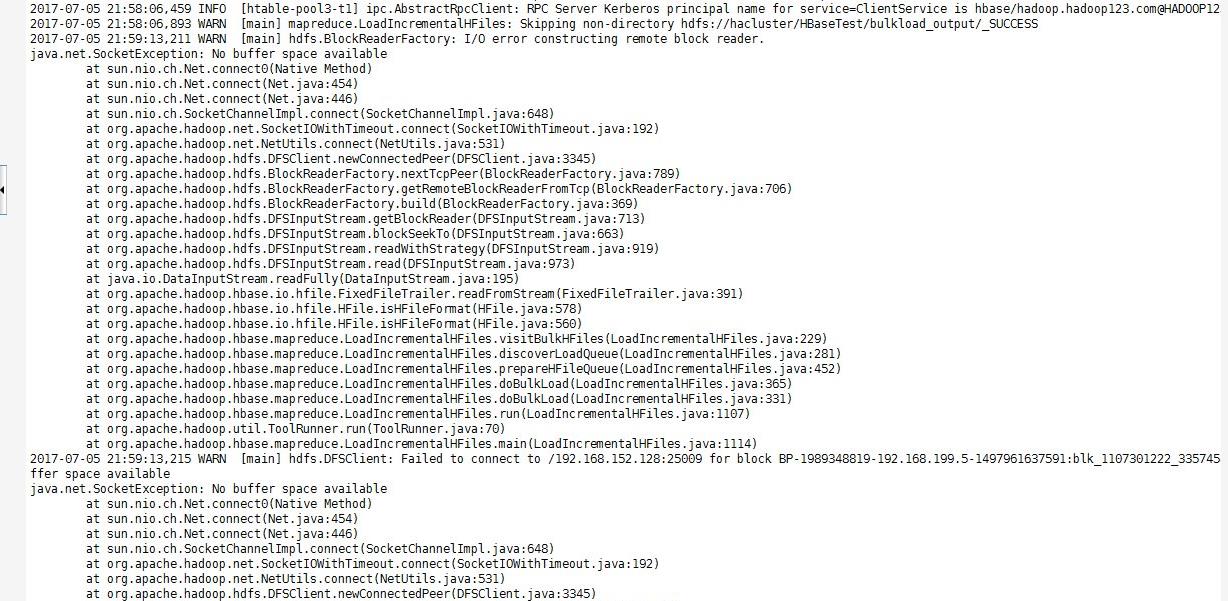Why Is "java.net.SocketException" Reported When Data Is Written to HDFS
Question
Why is an "java.net.SocketException: No buffer space available" exception reported when data is written to HDFS?
This problem occurs when files are written to the HDFS. Check the error logs of the client and DataNode.
The client logs are as follows:

DataNode logs are as follows:
2017-07-24 20:43:39,269 | ERROR | DataXceiver for client DFSClient_NONMAPREDUCE_996005058_86
at /192.168.164.155:40214 [Receiving block BP-1287143557-192.168.199.6-1500707719940:blk_1074269754_528941 with io weight 10] | DataNode{data=FSDataset{dirpath='[/srv/BigData/hadoop/data1/dn/current, /srv/BigData/hadoop/data2/dn/current, /srv/BigData/hadoop/data3/dn/current, /srv/BigData/hadoop/data4/dn/current, /srv/BigData/hadoop/data5/dn/current, /srv/BigData/hadoop/data6/dn/current, /srv/BigData/hadoop/data7/dn/current]'}, localName='192-168-164-155:9866', datanodeUuid='a013e29c-4e72-400c-bc7b-bbbf0799604c', xmitsInProgress=0}:Exception transfering block BP-1287143557-192.168.199.6-1500707719940:blk_1074269754_528941 to mirror 192.168.202.99:9866: java.net.SocketException: No buffer space available | DataXceiver.java:870
2017-07-24 20:43:39,269 | INFO | DataXceiver for client DFSClient_NONMAPREDUCE_996005058_86
at /192.168.164.155:40214 [Receiving block BP-1287143557-192.168.199.6-1500707719940:blk_1074269754_528941 with io weight 10] | opWriteBlock BP-1287143557-192.168.199.6-1500707719940:blk_1074269754_528941 received exception java.net.SocketException: No buffer space available | DataXceiver.java:933
2017-07-24 20:43:39,270 | ERROR | DataXceiver for client DFSClient_NONMAPREDUCE_996005058_86
at /192.168.164.155:40214 [Receiving block BP-1287143557-192.168.199.6-1500707719940:blk_1074269754_528941 with io weight 10] | 192-168-164-155:9866:DataXceiver error processing WRITE_BLOCK operation src: /192.168.164.155:40214 dst: /192.168.164.155:9866 | DataXceiver.java:304 java.net.SocketException: No buffer space available
at sun.nio.ch.Net.connect0(Native Method)
at sun.nio.ch.Net.connect(Net.java:454)
at sun.nio.ch.Net.connect(Net.java:446)
at sun.nio.ch.SocketChannelImpl.connect(SocketChannelImpl.java:648)
at org.apache.hadoop.net.SocketIOWithTimeout.connect(SocketIOWithTimeout.java:192)
at org.apache.hadoop.net.NetUtils.connect(NetUtils.java:531)
at org.apache.hadoop.net.NetUtils.connect(NetUtils.java:495)
at org.apache.hadoop.hdfs.server.datanode.DataXceiver.writeBlock(DataXceiver.java:800)
at org.apache.hadoop.hdfs.protocol.datatransfer.Receiver.opWriteBlock(Receiver.java:138)
at org.apache.hadoop.hdfs.protocol.datatransfer.Receiver.processOp(Receiver.java:74)
at org.apache.hadoop.hdfs.server.datanode.DataXceiver.run(DataXceiver.java:265)
at java.lang.Thread.run(Thread.java:748)
Answer
The preceding problem may be caused by network memory exhaustion.
You can increase the threshold of the network device based on the actual scenario.
Example:
[root@xxxxx ~]# cat /proc/sys/net/ipv4/neigh/default/gc_thresh* 128 512 1024 [root@xxxxx ~]# echo 512 > /proc/sys/net/ipv4/neigh/default/gc_thresh1 [root@xxxxx ~]# echo 2048 > /proc/sys/net/ipv4/neigh/default/gc_thresh2 [root@xxxxx ~]# echo 4096 > /proc/sys/net/ipv4/neigh/default/gc_thresh3 [root@xxxxx ~]# cat /proc/sys/net/ipv4/neigh/default/gc_thresh* 512 2048 4096
You can also add the following parameters to the /etc/sysctl.conf file. The configuration takes effect even if the host is restarted.
net.ipv4.neigh.default.gc_thresh1 = 512 net.ipv4.neigh.default.gc_thresh2 = 2048 net.ipv4.neigh.default.gc_thresh3 = 4096
Feedback
Was this page helpful?
Provide feedbackThank you very much for your feedback. We will continue working to improve the documentation.






